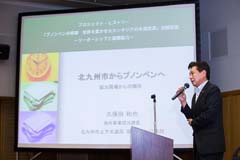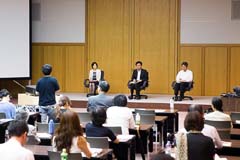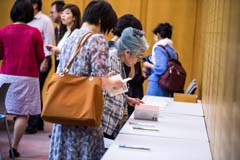The "Miracle of Phnom Penh": Seminar on Water Supply Reform in Cambodia
2015.08.04
The only places in Asia where safe drinking water can be obtained just by turning on a tap are Japan, Singapore, and Cambodia's capital Phnom Penh. Phnom Penh began tackling water supply reform in 1993 before the scars of years of civil war had healed. In just 15 years, the government had succeeded in providing almost all of the capital's population of more than one million with a safe and stable water supply at a low cost. This achievement was viewed with both astonishment and admiration by the rest of the world, and became referred to as the "miracle of Phnom Penh".
In March 2015, JICA Research Institute published the book "The Miracle of Phnom Penh: Cambodia's Amazing Water Supply Reform" (available in Japanese language only), which covers the background to this miracle based on a vast range of references and in-depth interviews with those involved. To commemorate the publication, JICA-RI held a seminar on water supply reform in Cambodia at the JICA Ichigaya Building on July 23, 2015,.

Kazuya Kubota of the Waterworks Bureau
of Kitakyushu City addresses the seminar
In his opening remarks, JICA-RI Director Ichiro Tambo explained that the book conducts multi-faceted analysis of specific examples of capacity development, describes the leadership and management processes, and also provides universal clues on management. "Today's seminar is a valuable opportunity to hear the first-hand experiences of the experts who played key roles in the development, and gain a solid understanding of the overall image of the miracle of Phnom Penh", he stated.

Speakers answer questions from
the floor
Following the opening address, Yasujiro Suzuki of the JICA Industrial Development and Public Policy Department, one of the authors, gave an outline of the "miracle of Phnom Penh", and explained how the business results of the Phnom Penh Water Supply Authority (PPWSA) improved over the 15 years with a comparison of data on water supply capacity, water quality standards, and coverage of the water supply system. He pointed to the strong leadership of the PPWSA General Director Ek Sonn Chan, government involvement to underpin the reform, and timely support by JICA and other aid agencies as key factors contributing to the success of the development. He said, "Achieving this miracle was only possible through Cambodia's self-help efforts, and international cooperation to support their efforts."
Another one of the authors, JICA Visiting Senior Advisor Kyoko Kuwajima, then spoke about General Director Ek Sonn Chan's leadership, and the reform in the initial stages. Prior to the reform, water supply facilities in Phnom Penh deteriorated badly during the civil war that continued through the 1970s, and water supply capacity plunged to about 40%. On top of this, black-market sales of water, illegal connections and diversions, and other forms of systematic corruption had become the norm, while leakage and water theft was widespread. The vast majority of residents had no access to water supply, and bought their water from water sellers and people in the neighborhood at prices 6-20 times the normal price. She explained that against this backdrop, Ek Sonn Chan, who was appointed Director of the then Water Bureau, embarked on a course of reform with support from international organizations in which he restored discipline, assembled a young team with shared aspirations, and formed a new relationship with users.
Next to address the seminar was Kazuya Kubota of the Waterworks Bureau of Kitakyushu City. Mr. Kubota was sent to PPWSA a total of four times from 1999 as a JICA technical cooperation project expert, and he spoke about cooperation in the field. At PPWSA, he was responsible for measures to combat water leakage and water theft. Theft through illegal diversions and leakage from shoddy construction was rife in Phnom Penh at that time, and no less 72% of the water distributed failed to generate revenue (as of 1993).

The book was displayed at the event
Water distribution blocks and a water distribution monitoring system were established to determine where leaks and water theft were occurring, and under General Director Ek Sonn Chan's leadership, water theft was exposed, and corruption was eliminated. Today, only 6% of water distributed in Phnom Penh does not generate revenue, which is lower than the corresponding rate of 8% in Kitakyushu City. Reflecting on the "miracle of Phnom Penh", Mr. Kubota said "This was achieved through the tireless efforts of individual government employees under the strong leadership of General Director Ek Sonn Chan."
The seminar finished with a question and answer session, and among the questions from the floor were "Are projects affected by the personalities of the leaders?," "Do traditional lifestyles in rural areas change with the introduction of water supply and wastewater facilities?," and "What were the factors that made water reform possible in the 1990s?"

事業事前評価表(地球規模課題対応国際科学技術協力(SATREPS)).国際協力機構 地球環境部 . 防災第一チーム. 1.案件名.国 名: フィリピン共和国.

事業事前評価表(地球規模課題対応国際科学技術協力(SATREPS)).国際協力機構 地球環境部 . 防災第一チーム. 1.案件名.国 名: フィリピン共和国.

事業事前評価表(地球規模課題対応国際科学技術協力(SATREPS)).国際協力機構 地球環境部 . 防災第一チーム. 1.案件名.国 名: フィリピン共和国.

事業事前評価表(地球規模課題対応国際科学技術協力(SATREPS)).国際協力機構 地球環境部 . 防災第一チーム. 1.案件名.国 名: フィリピン共和国.

事業事前評価表(地球規模課題対応国際科学技術協力(SATREPS)).国際協力機構 地球環境部 . 防災第一チーム. 1.案件名.国 名: フィリピン共和国.
scroll